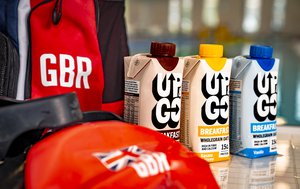Our latest hot topic is all about looking after your skeleton – quite apt given its Halloween!
Maintaining strong and healthy bones is vital for everyone, not just elite athletes or our skeleton friends. The key nutrient for looking after your bones is calcium, which also helps keep muscles, nerves and teeth healthy. A healthy, balanced diet will help you build strong bones from an early age and then maintain them throughout your whole life.
As well as calcium, Vitamin D is pretty key as it helps your body to absorb the calcium needed. Without these two nutrients you’re at risk of suffering from poor bone health, which can lead to rickets or osteoporosis, and an increased risk of breaking a bone from a fall later in life.
So how much calcium do we need? Adults aged 19 to 64 need 700mg of calcium a day, whilst teenagers have a higher requirement (1000mg for males and 800mg for females aged 11-18). You should be able to get all the calcium you need by eating a varied and balanced diet, rather than needing supplements, with dairy products the main source of calcium in the UK. For example one 200ml glass of milk has just over a 1/3 of your daily intake alone.

An alternative option for when on the go is UP&GO, a milk based breakfast drink that contains over 70% of your recommended daily intake of calcium per 330ml bottle - that’s almost 500mg of calcium per bottle putting you well on your way to your recommended daily intake! And the good news is that UP&GO also contains a healthy dose of Vitamin D, to help your body absorb that essential calcium.
Other good sources of calcium include:
- milk, cheese, yoghurts and other dairy foods
- green leafy vegetables, such as broccoli, cabbage and okra (but not spinach)
- soya beans
- tofu
- soya drinks with added calcium
- nuts
- bread and anything made with fortified flour
- fish where you eat the bones, such as sardines and pilchards
It is difficult to get all the vitamin D we need from our diet as we get most of our vitamin D from the action of the sun on our skin. Short (15mins) daily periods of sun exposure from late March to the end of September are enough for most people to make enough vitamin D.
Other good sources of vitamin D are:
- oily fish, such as salmon, sardines and mackerel
- eggs
- fortified fat spreads
- fortified breakfast cereals
This Heath Hub article was created in collaboration with British Swimming’s Official Breakfast Partner UP&GO, a healthy-on-the-go solution for when you’re on the move.

